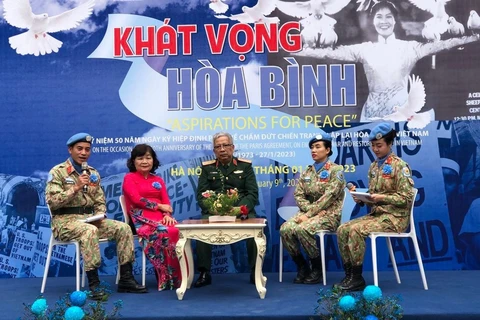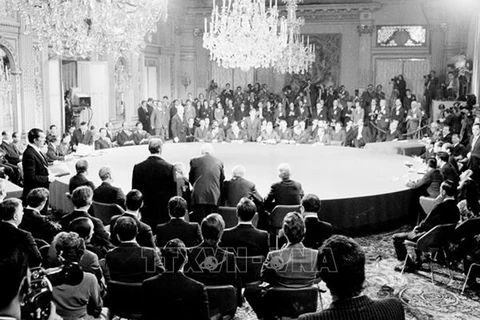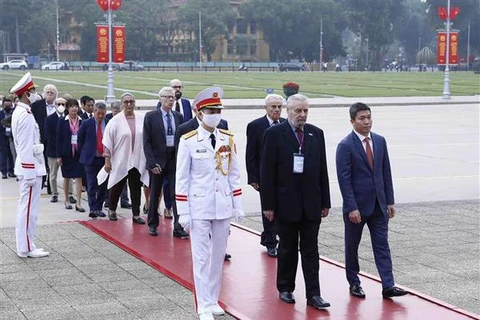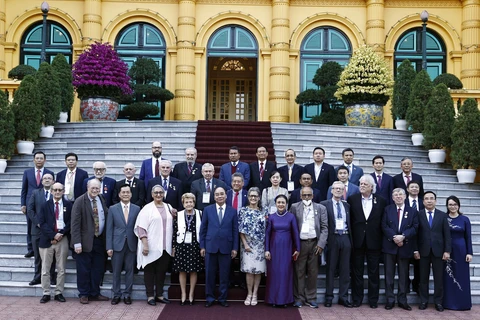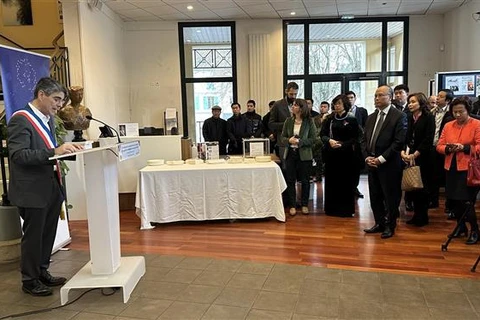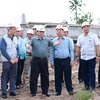 The Paris Peace Accords signing ceremony at the centre for international conferences in Paris, France, on January 27, 1973 (File photo: VNA)
The Paris Peace Accords signing ceremony at the centre for international conferences in Paris, France, on January 27, 1973 (File photo: VNA) The event was organised by the Party Central Committee’s Commission for Information and Education, the Ministry of Foreign Affairs, the Ho Chi Minh National Academy of Politics, and the Ministry of National Defence.
In his introductory remarks, Prof. and Dr Nguyen Xuan Thang, Politburo member, Chairman of the Central Theoretical Council and Director of the Ho Chi Minh National Academy of Politics, said that the Paris Peace Accords, signed on January 27, 1973, marked a turning point in the Vietnamese people’s resistance war against the US, creating favourable conditions for Vietnam’s revolution to obtain new triumphs, the peak of which was the great victory in the spring of 1975 that completely liberated the South and reunified the country.
The difficult and complicated Paris negotiations lasted for nearly five years. The agreement was initialed by Special Advisor Le Duc Tho of the delegation of the Government of the Democratic Republic of Vietnam and US Advisor Henry Kissinger on January 22, 1973 and officially signed on January 27, 1973.
The success of the Paris Peace Accords was the peak of Vietnam’s diplomacy during the 30-year liberation war and a forceful demonstration of the smart application of the late President Ho Chi Minh’s motto of “using the invariables to cope with the variables”, along with the Party’s policy of “increasing friends and reducing enemies”, precise forecasting and grasping of opportunities to win decisive victories, he noted.
 Prof. and Dr Nguyen Xuan Thang, Politburo member, Chairman of the Central Theoretical Council and Director of the Ho Chi Minh National Academy of Politics, addresses the symposium in Hanoi on January 16. (Photo: VNA)
Prof. and Dr Nguyen Xuan Thang, Politburo member, Chairman of the Central Theoretical Council and Director of the Ho Chi Minh National Academy of Politics, addresses the symposium in Hanoi on January 16. (Photo: VNA) For his part, Dr Le Hai Binh, Vice Chairman of the Commission for Information and Education, said the 50th anniversary of the Paris Peace Accords signing is an occasion to review precious historical lessons to apply in the new context; honour generations of Vietnamese people who dedicated their lives for the sake of the Fatherland’s peace, independence, and freedom, including the diplomatic struggle in Paris; and express gratitude to worldwide peace-loving people who supported the Vietnamese people’s resistance war against the US.
At the symposium, participants discussed the historical significance and lessons from the negotiation, signing, and enforcement of the Paris Peace Accords, along with the application of those lessons to the implementation of the 13th National Party Congress’s guidelines./.
VNA
